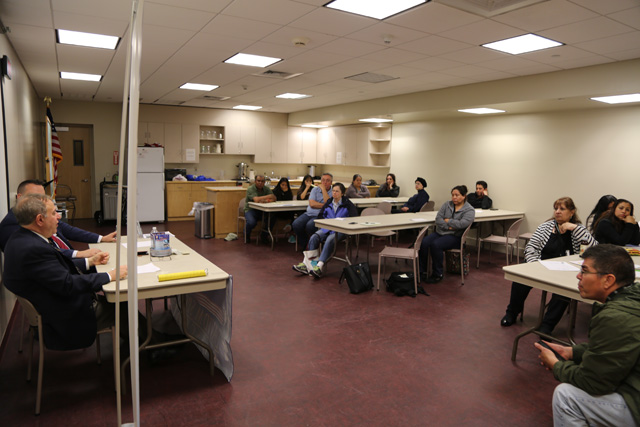Immigration attorney answers communities questions about ICE, deportation


Through hosting citizenship classes at the Riverhead Free Library, Millie Rios often fields questions from her students regarding immigration policies and consequences — especially since Donald Trump has taken office.
Ms. Rios said she’s always made an effort to answer the questions herself or bring speakers to class, but decided the community at large would benefit from a larger public forum.
So on Thursday, immigration attorneys David Sperling and Michael Nappo, who have a Riverhead office, sat before about 30 community members and fielded various questions about green cards, visas, criminal acts and deportation, among other topics.
In answering questions, Mr. Sperling aimed to clear up any confusion or misinformation circulating throughout the community.
“I have never seen before so much panic and fear in the Hispanic community,” he said. “A lot of this is irrational. We really need to get the word out to people … That’s why I think it’s really important to have forums like this.”
People with specific questions can visit www.davidsperlinglaw.com. Below are condensed versions to some of the questions asked by audience members.
How does Immigration and Customs Enforcement (ICE) find or choose people to deport?
David Sperling: There’s a misconception that ICE can just come around and pick up people in the street and deport them. That’s not true. That’s true in the case of someone who has a previous deportation order … If a person has a previous order of deportation and they have contact with the police, immediately they’re going to be taken into custody. All police have, in their patrol cars, access to a federal database of the 962,000 people [in the United States] who have deportation orders. So even if this person’s in a car and is stopped because they have a defective muffler and the policeman comes and asks for identification that can be fatal. But generally speaking, if someone does not have a deportation order and they haven’t committed a serious crime or they’ve been in the country for a long time they might be released on their own recognizance or might have to post bail.
How do criminal cases, such as DWIs, affect legal status and deportation?
DS: People that do have a criminal record or pending criminal case, they are at a substantially greater risk than before. When somebody comes into contact with the criminal justice system are when people are most at risk … A DWI, even a DWAI, which is a violation, is considered by immigration to be a significant misdemeanor. Anyone who has that is going to be dropped from DACA [Deferred Action for Childhood Arrivals] and subject to being deported, for example. How do they find out? When you renew your work permit they take your fingerprints. Any contact with law enforcement is going to show up and unless it was dismissed, it would be held against you … the immigration consequences of a criminal conviction are far more serious than the criminal sentence.
If someone has a deportation order will their child be deported also?
DS: If ICE is let in, or maybe they’re able to get in in some way, everybody in that household [where one person has a deportation order] is subject to being taken in also … But if the kids are U.S. citizens, practically speaking, it really has never [been an issue.]
Can someone bring other family members into the United States?
DS: If you are a U.S. citizen or have a green card you can petition for certain classes of relatives to bring them into the United States or for them to do consular processing [an individual who is the beneficiary of an approved immigrant may apply for an immigrant visa in order to come to the United States and be admitted as a permanent resident].
Any words of wisdom to share?
DS: I would say there’s no reason to panic. There’s rumors of raids and people are afraid to leave their houses or send their kids to school and almost always these rumors are false. Immigration’s conducting targeted raids, they’re looking for specific people. The people who behave the law and have equities in the United States — you have children, you’re involved in the community, you’re a good neighbor — we don’t want to deport people like those.
Photo credit: Nicole Smith






